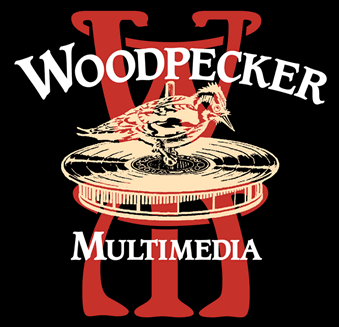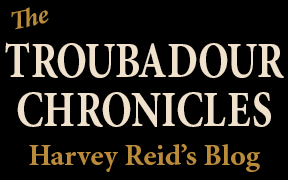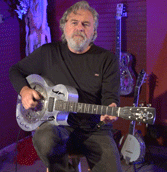This is part of an authorized online posting of Harvey Reid's important book, "The Troubadour Chronicles," published in May 2020. It is available in paperback from this web site or from Amazon.com.

“When I strike harmonious chords, the beasts of the field encompass me, leaping for joy….” [Linghen Kouei China, 3000 BC]
Chapter 23: The Troubadour Arts Going Forward
Troubadours have infiltrated the highest echelons of the music business, our ranks have swelled with new singers, performers and creators, and our skills have grown and spread to the farthest corners of our planet. The songs we mysteriously extract from the ethers have generated hundreds of billions of dollars and touched billions of lives. People everywhere continue to find an unencumbered joy in making and sharing their own personal songs. More than half of adults now carry in their pockets the tools that enable us to tune a guitar perfectly, and to capture and instantly share either our musical magic or our blunderings across the world. In just the last twenty years, amplification technology has finally slain the fierce acoustic dragons that for thousands of years have limited the troubadour’s power to tiny gatherings and small spaces. Though our skills are still not part of the music that society tries to teach its children in schools, nearly anyone anywhere who wants to learn our musical ways can find the knowledge that was once so fleeting and scarce, without expense, hardship, happenstance or embarking on a pilgrimage. Each generation seems to succeed in finding or creating forms of music that alarm their parents, though at long last the idea that a young person might want to accompany themselves on a musical instrument while singing rhythmic, rhymed songs is no longer feared, outlawed or stigmatized, or seen as the work of the Devil.
Yet it is not just that troubadours have been given the tools to turn personal music into money, influence or power. Humanity itself is under siege, like never before, from circuits, robots and gigantic, inhuman forces that shape our lives, study our habits and record everything possible about us while relentlessly selling us everything they can. Computers can now beat us at chess and checkers. So maybe we should not spend so much energy playing those games, and instead do the things humans do best– and let the machines and robots do what they are good at. Many of us struggle to feel free and triumphant, and to extricate ourselves from a sensation of being trapped in the Matrix, and to find sanctuary from the endless measurement and ever-growing pressures of information and electronic social tethers. One of the places we can reliably escape from the insidious digital prisons and the temptation to try to know what everyone else is doing– is to explore the realm of personal music. People of all ages, classes and cultures have done this throughout history in uncountable forms, and the ability of music-making to be vital, valuable, pleasurable and meaningful for us remains undiminished as homo sapiens and Planet Earth careen into the third millennium. Scientists and holy people have long told us about vibrations; when we are participating, generating and controlling those vibrations ourselves it connects our inner beings to the physical world in a way that is like no other.
The best harp-lute player in a part of the Ivory Coast once told Hugo Kemp why he played music. He said that he had been visited in a dream or vision by two “dwarf-genii” who told him he needed to die, but his suicide attempt failed, and a village soothsayer told him that the problem was that he was not playing music, as his family had always done. To save his life, he was told to play the harp-lute that had belonged to his dead brother. People were attracted to his music right away, the man quickly gained proficiency, and was asked to play for gatherings. Maybe many of us are going to die, or feel like we are dead, if we don’t also create some personal vibrations of our own. So-called “primitive” people commonly sing and create music, and don’t seem to worry if they are not skilled or professional singers. Maybe they are not as primitive as we think, and it is quite possible that as civilization moves “onward” it might benefit greatly from the very kinds of “vulgar” and “archaic” music that Western civilization has long shunned. It can also be argued that troubadour music has retained those “magico-religious” elements better than other forms. Our children might best obtain those mysterious but important benefits of art and music, whose virtues good parents and educators so often extol– not by participating in the bands, choirs and orchestras that are so entrenched in our education system, but by exploring their own notions of songwriting and personal music.
Music-making is both entertainment and escape, and it is a unique form of personal joy. It is prayerful, sacred and celestial. It can be private or public, connection, distraction or affirmation, magic, amusement, or just a pastime. It offers all of us a way to embrace our most fundamental human forms and do what our distant ancestors did when they needed power, uplift and meaning. Not only in a cathedral, but even in a small room or any quiet place, we can go inward and upward, just as we might on a mountain top in the wilderness. If we yield to the comforting pulse and hypnosis of the rhythms we feel swirling inside us, and merge the resonances of our voices, the sound and meanings of our words and languages together with whatever our hands can pull from our musical instruments, all of us can connect to something huge and vital that is hovering around us, just as it has been hovering around all people through all time. Those of us who find the footbridge to our own individual musicality can gain something simple but immense that has always been part of the human experience, and that something is just as vital in the age of the silicon chip as it was in the time of the clay tablet or the mastodon bone.
Let the era of the 21st century troubadour blossom and unfold. Almost all of us now have easy access to the instruments, information, inspirations, and the power to nurture, share and project our personal musical magic and sonic experiments in unprecedented ways. We should seek to drink the purest human musical water we can find, not from bottles or pipes, but as it bubbles fresh from the ground in the sacred places where it flows. And if we follow that purity to its source, we find individuals connecting to something holy– not crowds, machines or algorithms.
Maybe Not Much Has Changed...
Somewhere in Southern France in the middle of the 12th century a man named something like Bernard de Ventadorn (1135-1194) wrote one of the first known songs of a new type, called “Can vei la lauzeta mover,” which in the Occitan dialect of Old French means “When I See the Lark Move.” This song is still sung today, and may have inspired Danté’s “Divine Comedy.” As he watched the lark, Bernard sang [translation by James Donalson]:
“Alas! How much of love I thought I knew, and how little I know,
For I cannot stop loving her from whom I may have nothing.
All my heart, and all herself, and all my own self and all I have
She has taken from me, and leaves me nothing but longing and a seeking heart.”
Almost 450 years later in 1597, 35-year-old English lutenist and singer John Dowland published his “First Booke of Songes or Ayres.” It became a classic, and its 21 songs and tunes have been performed regularly ever since. In the very first song, “Unquiet Thoughts,” he sang, “How shall I then gaze on my mistress’ eyes?/My thoughts must have some vent, else heart will break.”
In May 1924, an African-American man named Ed Andrews, about whom nothing is known except that he might have been blind and was thought to be approaching middle age, sat with his 12-string guitar in front of an OKeh Records carbon-granule microphone in a makeshift studio in a rented building in Atlanta, and made the first self-accompanied guitar/vocal blues recording, “Barrelhouse Blues.” He began singing, “Hear me knockin, come runnin’ to your door/ I ain’t a stranger, I been here before.”
Thirty seven and a half years later, twenty-year-old Bob Dylan sat alone with his Gibson J-50 guitar and a Hohner Marine Band harmonica around his neck on November 20, 1961 in Columbia Records Studio A at 799 Seventh Avenue in New York City, to begin his first recording session. An RCA 77-DX ribbon microphone was in front of his face, and a Neumann KM-54 pointed at his guitar. A few minutes after the 7pm session began, he sang the first line of what were to be eight takes of Georgia bluesman Jesse Fuller’s song “You’re No Good,” that he had heard the 64-year-old Fuller (1896-1976) sing at the Exodus coffeehouse in Denver the previous year. The opening line of the first of the 43 combined takes of seventeen songs that would become his first album was, “I don’t know why I love you like I do/ nobody in the world can get along with you...” Take 5 was used for the album.
On August 15, 1969, at 5:07pm, twenty-eight year-old African-American singer-guitarist Richie Havens took the stage for the first set of music at the legendary Woodstock Music Festival, in front of almost 500,000 people. He opened with the nearly four-minute acoustic guitar/vocal song “From the Prison,” written by his friend Jerry Merrick, where Havens sang repeatedly, “Save your love for every moment, save your love for every day/ Save your love for every moment and forever give your love away...”
Thirty-four years after that, in 2003, 13-year-old superstar-to-be Ed Sheeran set up a mike in his bedroom in Framingham, England, and sang an original song titled “I Love You” with his fingerpicked acoustic guitar. It appeared along with four other songs on a 17-minute, self-released EP called “The Orange Room.” (An original copy of that CD recently sold for nearly $1000.) The song began, “I’m standing on a mountain, waiting for you to come/ You were sitting, counting the days that I had gone...”
Any one of these lyrics or performances could just as well have been delivered by other male or female medieval troubadours 800 years ago, by an oud-playing slave girl in North Africa or Islamic Spain centuries before that, or even two or three thousand years earlier by Hittites or Sumerians. If the human race survives another thousand years (or even 34 for that matter), very likely people will be rhythmically strumming or picking on a stringed instrument while singing ardently about love. We troubadours and our musical passions have always been part of the soundtrack of humanity, and it is almost certain we will be among the last to be replaced by robots or software.
Read Chapter 1
I'm trying to raise issues, questions and awareness in the world of modern troubadours... I want people to find this in web searches and to read it. I don't have a way for you to comment here, but I welcome your emails with your reactions. Feel free to cheer me on, or to disagree...
Chordally yours,
HARVEY REID
©2021
 H
H 


